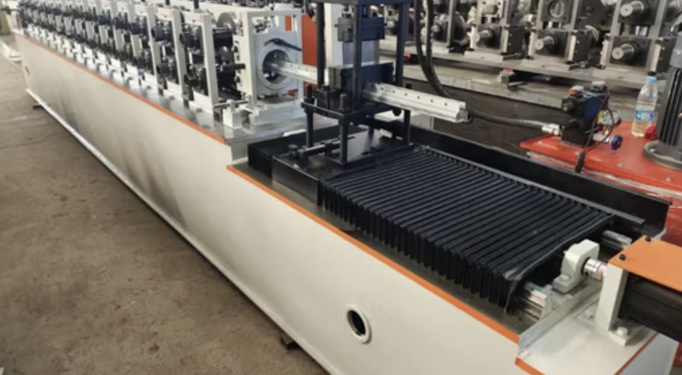
Posted on Monday, November 4, 2024
Roll forming machines are essential in manufacturing processes across various industries, from construction to automotive. In Jordan, where infrastructure development is continuously growing, these machines offer efficiency and precision, particularly for creating profiles such as roofing panels, drywall studs, and tracks. However, purchasing a roll forming machine requires careful consideration, especially given the nuances of new versus used machines, power supply requirements, and import logistics. This guide breaks down the key factors to help you make an informed decision.
When buying a new roll forming machine, you gain access to the latest technology, warranties, and options for customization. New machines are designed with advanced features for higher efficiency, reduced waste, and improved safety, making them ideal for businesses looking to scale production and maintain a competitive edge.
In Jordan, demand often focuses on profiles used in construction, such as roofing panels and metal framing profiles. Ensure the machine you select can create profiles to the dimensions and thicknesses required for your industry.
Used roll forming machines are a budget-friendly option, especially for small to medium enterprises or companies testing new product lines. These machines can offer substantial cost savings, allowing you to start or expand production without a hefty financial outlay.
Jordan has specific power supply standards that must be considered when purchasing a roll forming machine. Machines are typically configured for either 230V single-phase or 400V three-phase systems. Before finalizing your purchase, verify the power requirements of the machine and consult your supplier about any necessary adaptations. Some machines might require a voltage converter to match local power standards, so it’s important to factor this into your budget and setup process.
When purchasing a machine from an international supplier, you’ll need to manage the logistics of shipping and customs. Here are some steps to simplify the process:
Investing in a roll forming machine can be a considerable expense. Fortunately, several financing options are available:
Proper maintenance is essential to extend the lifespan of your roll forming machine. When choosing a machine, prioritize suppliers who offer ongoing support, training, and access to spare parts. Many suppliers now provide remote troubleshooting and support, which can be invaluable in minimizing downtime. Some suppliers have partnered with local technicians, allowing for faster in-person assistance for repairs and maintenance.
Q1: What factors should I consider when choosing between a new and a used roll forming machine in Jordan?
A: When deciding between a new and a used machine, consider factors such as budget, the level of customization required, and the expected lifespan. New machines often come with advanced features, warranties, and customization options, while used machines offer significant cost savings and are ideal if they meet your production needs.
Q2: What are the common power supply requirements for roll forming machines in Jordan?
A: Power supply compatibility is essential. Jordan typically uses a 230V single-phase or 400V three-phase system. Ensure the machine you choose is compatible or inquire about voltage converters from the supplier to meet local standards.
Q3: Which profiles are popular for roll forming machines in Jordan?
A: Popular profiles in Jordan include roofing panels, drywall studs, and track profiles, which are widely used in construction. Confirm that your chosen machine can handle the dimensions and gauge thickness required by your projects.
Q4: What shipping and logistics considerations are there for importing a roll forming machine to Jordan?
A: Shipping costs, import taxes, and customs documentation are essential to factor in. Work with suppliers experienced in exporting to Jordan to simplify the process, or hire a customs broker for additional support with regulations and duties.
Q5: Are there financing options available for buying a roll forming machine in Jordan?
A: Yes, financing or leasing options are often available through suppliers, Jordanian banks, or government-supported programs. Discuss these options with your supplier and consult local banks to find a solution that fits your budget.
Q6: How can I ensure reliable maintenance and support for my roll forming machine in Jordan?
A: Look for suppliers who offer local support or remote troubleshooting and training. Some suppliers have local partnerships, which can facilitate faster service for maintenance and repairs.
Q7: How do I know if a used roll forming machine is in good condition?
A: Ask for maintenance records, inspect for wear, and verify the functionality of essential components like rollers and motors. If possible, view a demonstration of the machine in operation to ensure it’s in working order.
Purchasing a roll forming machine in Jordan requires careful consideration of your budget, production needs, and the unique conditions in Jordan, such as power supply standards and import logistics. By thoroughly assessing the options available and working closely with reliable suppliers, you can select a machine that fits your business needs and supports efficient, high-quality production.

Used Purlin Roll Forming Machines for Sale Worldwide
Posted on Sunday, January 25, 2026
Pre-Owned Roll Forming Machines for Purlin & Structural Steel Profiles

Used Roof Panel Roll Forming Machines for Sale Worldwide
Posted on Sunday, January 25, 2026
Pre-Owned Roll Forming Machines for Roofing Panel Production

Used Roll Forming Machines for Sale Worldwide
Posted on Tuesday, January 20, 2026
Pre-Owned Roll Forming Machines with Inspection, Verification & Global Support

Steel Coil Supply for Roll Forming Machines Worldwide
Posted on Tuesday, January 20, 2026
Reliable Steel Coil Supply for Roll Forming, Fabrication & Manufacturing Applications
Copyright 2026 © Machine Matcher.